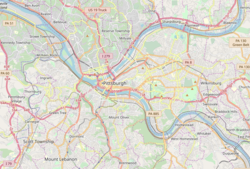Wightman School | |
 | |
| Location | 5604 Solway St., Pittsburgh, Pennsylvania |
|---|---|
| Coordinates | 40°26′33″N79°55′37″W / 40.44250°N 79.92694°W |
| Area | 1 acre (0.40 ha) |
| Built | 1897 [1] |
| Architect | Ulysses J. Lincoln Peoples |
| Architectural style | Classical Revival, Romanesque Revival |
| MPS | Pittsburgh Public Schools TR |
| NRHP reference No. | 86002717 [2] |
| Added to NRHP | September 30, 1986 |
The Wightman School is an historic, American building that is located in the Squirrel Hill neighborhood of Pittsburgh, Pennsylvania. Built in 1897, it was listed on the National Register of Historic Places in 1986. [2]




